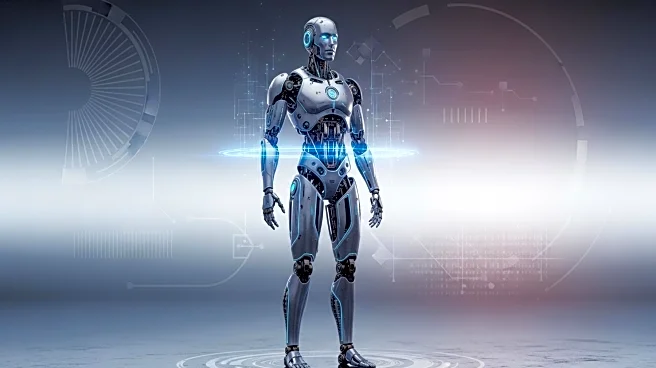What's Happening?
Boston Dynamics and Toyota Research Institute have demonstrated a humanoid robot powered by a Large Behavior Model (LBM), marking a significant advancement in robotics and AI. The robot, Atlas, showcased its ability to perform complex tasks involving object manipulation and locomotion, all controlled by a single LBM. This model allows for the rapid addition of new capabilities without the need for extensive programming. The collaboration between Boston Dynamics and Toyota, initiated in October 2024, aims to leverage their combined expertise to accelerate the development of intelligent robots.
Why It's Important?
The demonstration of a humanoid robot powered by a Large Behavior Model represents a major leap forward in the field of robotics. This technology has the potential to revolutionize industries by providing general-purpose humanoid assistants capable of performing a wide range of tasks. The ability to quickly adapt and learn new behaviors could lead to increased efficiency and productivity in various sectors, including manufacturing, logistics, and healthcare. The development of such advanced robots also raises important questions about the future of work and the role of AI in society, potentially impacting labor markets and economic structures.
What's Next?
Following the successful demonstration of the humanoid robot, Boston Dynamics and Toyota Research Institute are likely to continue refining and expanding the capabilities of their Large Behavior Model. This could involve further research into the integration of AI models with physical robotics, as well as exploring new applications for these technologies. As the field of robotics advances, there may be increased interest from other companies and industries in adopting similar technologies. Additionally, discussions around the ethical and societal implications of humanoid robots are expected to intensify, potentially influencing regulatory frameworks and public perception.
Beyond the Headlines
The development of humanoid robots with advanced AI capabilities raises important ethical and societal considerations. As these robots become more integrated into everyday life, questions about their impact on employment, privacy, and human interaction will become increasingly relevant. The potential for humanoid robots to perform tasks traditionally done by humans could lead to significant shifts in labor markets, necessitating new approaches to workforce development and education. Additionally, the presence of humanoid robots in public and private spaces may prompt discussions about privacy and security, as well as the ethical treatment of AI entities.









